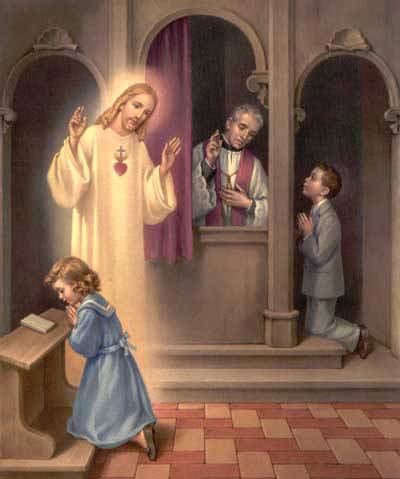First Reconciliation

Reconciliation, the sacrament of healing, is a sacramental celebration in which, through God’s mercy and forgiveness, the sinner is reconciled with God and also with the Church, Christ’s Body, which is wounded by sin. (Catechism of the Catholic Church 1422, 1442-5, 1468)
When should my child receive First Reconciliation?
The sacrament of First Reconciliation follows baptism and is initiated, usually, at the age of seven or eight years old. A child, whether that child is seven years old, eight years old, nine years old, or older, is only capable of age appropriate readiness for participation in the celebration of the sacrament of reconciliation. A seven-year-old can only understand God’s mercy and forgiveness as a seven-year-old. Furthermore, a child’s ability to comprehend such a concept as conscience temptation, intention, and sin – both mortal and venial sin – is also limited by age and moral development. As a child grows in knowledge and faith his or her understanding and appreciation of the sacraments will naturally deepen. It is then determined that the readiness of a child is dependent upon their understanding of the difference between a mistake and a sin.
Getting my child ready
Children, baptized as infants, have been watching, practicing, discerning, and living the Catholic faith for approximately seven years. They have a developed sense of imagination, which helps them to engage in liturgy with its stories, ceremonies, and ritual. Children are also required to participate in Parish School of Religion Classes which begin in Kindergarten. These children will be taught what it means to be a Catholic as well as begin to foster relationships with Catechist of the Parish, other children their age, and leaders of the community.
- They learn the stories of other Christians and saint-heroes who dedicated their lives to Christ.
- They learn the story of Jesus and his friends from parents and catechists.
- Children use this information to form their imagination and their knowledge of Jesus in order to discern how to model their lives on the life of Jesus.
-
They watch their parents, relatives, and friends model their lives as Jesus thus discerning how to model their lives on the life of Jesus.
- As we all know, a child is concerned about the evaluation and feedback of other significant people in his or her life. Children absorb images of God and the way God relates to his people through their experience of parents, siblings, and extended family.
This is a tender time in the faith life of the baptized Catholic. His or her relationship with adults in the community will form or de-form his or her relationship with God. The influence of these people will shape the young person’s desire to be a witness in faith on a daily basis.
Parent Participation
The primary goal of sacramental preparation is conversion. Leading people to sacraments is about taking hold of this unique opportunity to inform, form, and transform lives. In the sacramental preparation sessions we include parents and teachers to work together as catechist. It is therefore important that we include parents in the program to lead them on the spiritual journey with their children to more deeply seek the living God and continue the way of faith and conversion that began with their baptism.
We also require parent participation because:
- Parents, being the first and foremost teachers of their faith to their children and fulfilling a baptismal promise to raise them in their faith, have an opportunity to learn more about the catholic faith and rekindle their burning desire for God.
- They are encouraged to continue having dialog with their child/children during this important time in their child’s faith development.
- The sessions are offered to help families pass on the faith.
- Particular emphasis is placed on conversion: our inner changes, our struggles, and the loving mercy of God, which is available to us in the striving to do good and avoid evil.
** For more information regarding First Reconciliation, preparation, or Parish School of Religion classes you can contact
Mary Kruse at 225-647-8461 or by emailing her directly.**